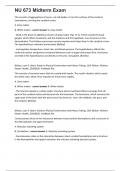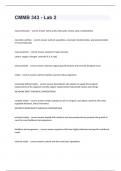NU 673 Midterm Exam
This consists of aggregations of neuro- nal cell bodies. It rims the surfaces of the cerebral
hemispheres, forming the cerebral cortex
A. Gray matter
B. White matter - correct answer A. Gray matter
- Deep in the brain lie additional clusters of gray matter (Fig. 17-2). These include the basal
ganglia, which affect movement, and the thalamus and the hypothala- mus structures in the
diencephalon. The thalamus processes sensory impulses and relays them to the cerebral cortex.
The hypothalamus maintains homeostasis (Bickley)
- and regulates temperature, heart rate, and blood pressure. The hypothalamus affects the
endocrine system and governs emotional behaviors such as anger and sexual drive. Hormones
secreted in the hypothalamus act directly on the pitu- itary gland. (Bickley)
Bickley, Lynn S. Bates' Guide to Physical Examination and History Taking, 12th Edition. Wolters
Kluwer Health, 20160620. VitalBook file.
This consists of neuronal axons that are coated with myelin. The myelin sheaths, which create
the white color, allow nerve impulses to travel more rapidly.
A. Gray matter
B. White matter - correct answer B. White matter
- The internal capsule is a white-matter structure where myelinated fibers converge from all
parts of the cerebral cortex and descend into the brainstem. The brainstem, which connects the
upper part of the brain with the spinal cord, has three sec- tions: the midbrain, the pons, and
the medulla. (Bickley)
Bickley, Lynn S. Bates' Guide to Physical Examination and History Taking, 12th Edition. Wolters
Kluwer Health, 20160620. VitalBook file.
Consciousness relies on the interaction between intact cerebral hemispheres and a structure in
the diencephalon and upper brainstem
A. Reticular activating system
B. Cerebellum - correct answer A. Reticular activating system
- Consciousness relies on the interaction between intact cerebral hemispheres and a structure
in the diencephalon and upper brainstem, the reticular activating (arousal) system.
,NU 673 Midterm Exam
- The cerebellum, which lies at the base of the brain, coordinates all movement and helps
maintain the body upright in space. (Bickley)
Bickley, Lynn S. Bates' Guide to Physical Examination and History Taking, 12th Edition. Wolters
Kluwer Health, 20160620. VitalBook file.
Determine how many segements of the ff
A. Cervical
B. Thoracic
C. Lumbar
D. Sacral - correct answer A. Cervical C1-C8
B. Thoracic T1-T12
C. Lumbar L1-L5
D. Sacral S1-S5
This regulates muscle movements and response to the sensations of touch and pain
A. Somatic
B. Autonomic - correct answer A. Somatic
- The peripheral nervous system (PNS) consists of both CNs and periph- eral nerves that project
to the heart, visceral organs, skin, and limbs. It controls the somatic nervous system, which
regulates muscle move- ments and response to the sensations of touch and pain, and the
autonomic nervous system that connects to internal organs and gener- ates autonomic reflex
responses. The autonomic nervous system consists of the sympathetic nervous system, which
"mobilizes organs and their functions during times of stress and arousal, and the para-
sympathetic nervous system, which conserves energy and resources during times of rest and
relaxation."5 (Bickley)
Bickley, Lynn S. Bates' Guide to Physical Examination and History Taking, 12th Edition. Wolters
Kluwer Health, 20160620. VitalBook file.
Determine the pairs of peripheral nerves
A. Cervical
B. Thoracic
,NU 673 Midterm Exam
C. Lumbar
D. Sacral
E. Coccygeal - correct answer A. Cervical- 8
B. Thoracic- 12
C. Lumbar- 5
D. Sacral- 5
E. Coccygeal- 1
- The PNS includes spinal and peripheral nerves that carry impulses to and from the cord. A
total of 31 pairs of spinal nerves attach to the spinal cord: 8 cervical, 12 thoracic, 5 lumbar, 5
sacral, and 1 coccygeal. Each nerve has an anterior (ventral) root containing motor fibers, and a
posterior (dorsal) root containing sensory fibers. The anterior and posterior roots merge to
form a short spinal nerve, <5 mm long. Spinal nerve fibers commingle with similar fibers from
other levels in plexuses outside the cord, from which peripheral nerves emerge. Most
peripheral nerves contain both sensory (afferent) and motor (efferent) fibers. (Bickley)
Bickley, Lynn S. Bates' Guide to Physical Examination and History Taking, 12th Edition. Wolters
Kluwer Health, 20160620. VitalBook file.
Determine the Cranial Nerve:
Oflactory: sense of smell
A. I
B. Ii
C. III
D. IV
E. V
F. Vi
G. VII
H. VIIi
I. IX
J. X
, NU 673 Midterm Exam
K. Xi
L. XII - correct answer XII Hypoglossal motor tongue
Determine the Cranial Nerve:
Optic: vision
A. II
B. I
C. III
D. IV
E. VI
F. V
G. VIII
H. VII
I. IX
J. XI
K. X
L. XII - correct answer A. II
This mediate voluntary movement and integrate skilled, complicated, or delicate movements by
stim- ulating selected muscular actions and inhibiting others. They also carry impulses that
inhibit muscle tone, the slight tension maintained by normal muscle even when it is relaxed.
(Bickley)
A. Corticospinal (pyramidal) tract
B. Basal Ganglia
C. Cerebellar system - correct answer A. Corticospinal (pyramidal) tract
- The corticospinal (pyramidal) tract. The corticospinal tracts mediate voluntary movement and
integrate skilled, complicated, or delicate movements by stim- ulating selected muscular
actions and inhibiting others. They also carry impulses that inhibit muscle tone, the slight
tension maintained by normal muscle even when it is relaxed. The corticospinal tracts originate
in the motor cortex of the brain (Fig. 17-6). Motor fibers travel down into the lower medulla,
where they form an anatomical structure resembling a pyramid.





